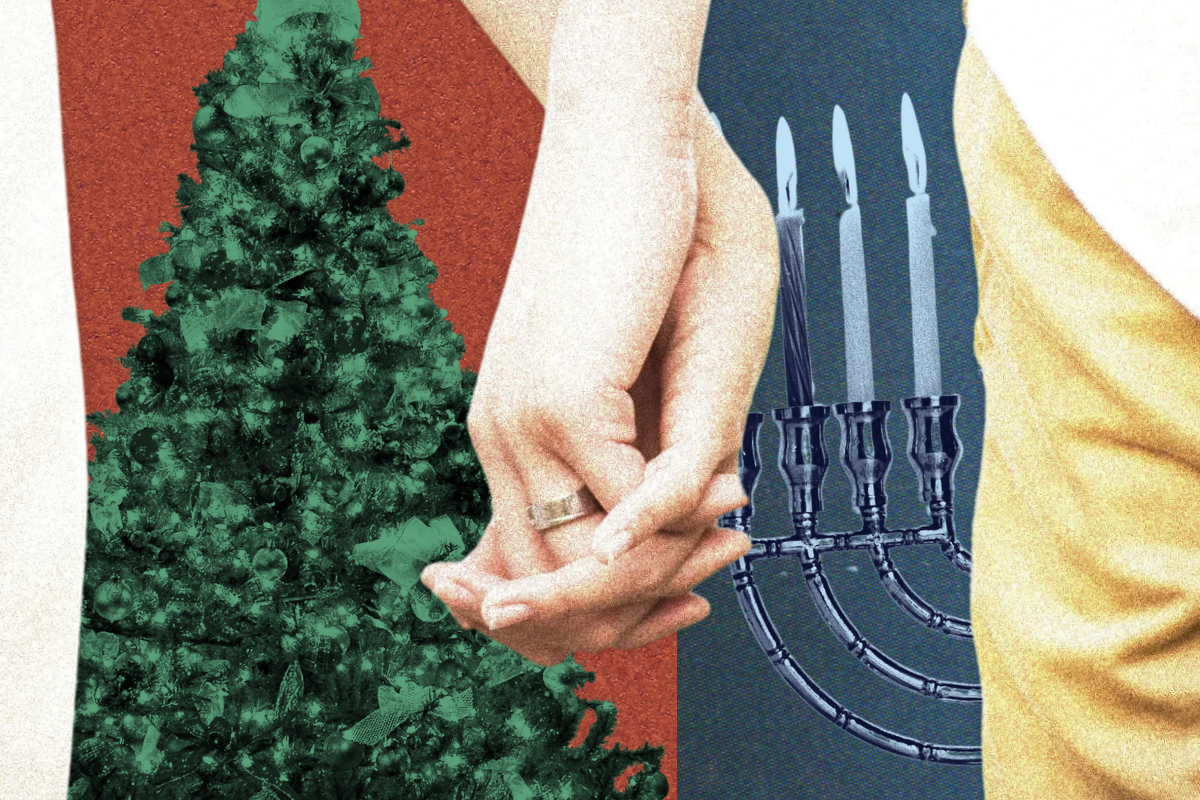What do the winter holidays mean to you?
For some, this truly is “the most wonderful time of the year.” Vacations from work provide a welcome opportunity to relax. Holiday gatherings are warm and fun, full of food, music, games and tradition, as everyone travels from near and far to see their loved ones.
But at times, things can get a little complicated around the holidays. Family relationships don’t always run smoothly — especially if you’re introducing a new partner into the mix. And in interfaith or intercultural couples, it’s easy for things to get lost in translation.
Getting into a relationship with someone from a different cultural or religious background can make you question a lot of things about yourself. When my British ex-husband introduced me to Christmas for the first time, the experience felt new. December was supposed to be about spinning dreidels and crispy latkes with applesauce. As an American Jew, wasn’t I meant to be eating Chinese food and watching a movie on Christmas Day?
With an Ashkenazi Jewish dad, a Cochin Jewish mom and a Chinese stepmom, it’s fair to say I had a lot of experience dealing with diverse traditions when I was growing up. Still, I felt a little guilty about celebrating the forbidden holiday with the big fir tree and the man in the red suit.
If you’re dealing with an interfaith holiday season for the first time, here are some tips to help.
Figure out which traditions are important to you
First, take some time to reflect on your own views about holiday traditions. Try not to worry too much about what other people might think. Instead, think about what’s truly important to you.
Would you prefer to celebrate the holidays the same way every year — going to synagogue, seeing your family or eating certain foods? Would you be willing to participate in your partner’s traditions? What if they conflict with yours? (For example, this year, Hanukkah and Christmas fall on the same day.) Are you open to creating new traditions together?
If your partner is from another city or country, what if there is no Jewish community there, or certain foods aren’t available? How would you handle this situation?
Once you’ve thought things through, you’ll be able to communicate your needs to your partner.
Talk to your partner about their traditions
Take some time to ask your partner how they like to celebrate the holidays. Keep in mind that they might never have had to think about this issue before, so you may have to prompt them a bit to get their thoughts on it.
There’s a chance your partner’s family might not know much about Judaism. Maybe they’re curious, excited, upset or simply neutral to your religious differences. They might take their own holiday traditions very seriously. Or perhaps they don’t celebrate anything at all during the “holiday season.”
If Jewish traditions are important to you, why not take the time to teach your partner about them? Cook Jewish foods, teach your partner some Hebrew, talk to them about your family history or tell them the story of the holidays. Make space for them to teach you about their traditions too, if that’s something that’s important to them.
Consider the best way to introduce your partner to your family
Interfaith relationships are a cultural taboo in some communities. If your family is Reform, Reconstructionist or secular, they may not mind you being in an interfaith relationship. But if your family is more religious or traditional, they might be anything from mildly peeved to grievously offended.
Regardless of what decision you make about the holidays, be prepared to stand by it. Ideally, everyone will be happy with the final arrangements: you, your partner and both of your families. But sadly, this isn’t always the case.
If problems arise, try to be patient with yourself, your partner and your family members as you work things through. Ideally, you’ll want to communicate in a way that’s clear and firm, but also respectful. Still, remember that you can’t control other people’s reactions to what you do. All you can do is express your feelings and stand by your choices.
Keep an open mind and try to stay positive
If you’re young, you’re probably used to seeking your parents’ approval. As you grow older, you’ll need to decide what your own values are and how you’re going to apply them in your life. Other people can tell you their opinions, but ultimately you have to do what you think is right.
The holiday season can bring up a lot of difficult feelings, from religious confusion and family conflicts to practical concerns about money, travel and time off work. For some couples, these issues can cause stress and put a strain on the relationship. Hopefully though, your relationship will become stronger as you learn how to communicate with your partner and work out your differences together.
On the positive side, there’s always the chance that things will go smoothly and you’ll end up having a lot of fun! Meeting your partner’s family and learning about their traditions can be an interesting and exciting experience. The main key is respect, keeping an open mind and remembering that the holidays are just one small piece of the life you’re building together. And if things don’t go exactly as planned this year — there’s always next year to try again.



